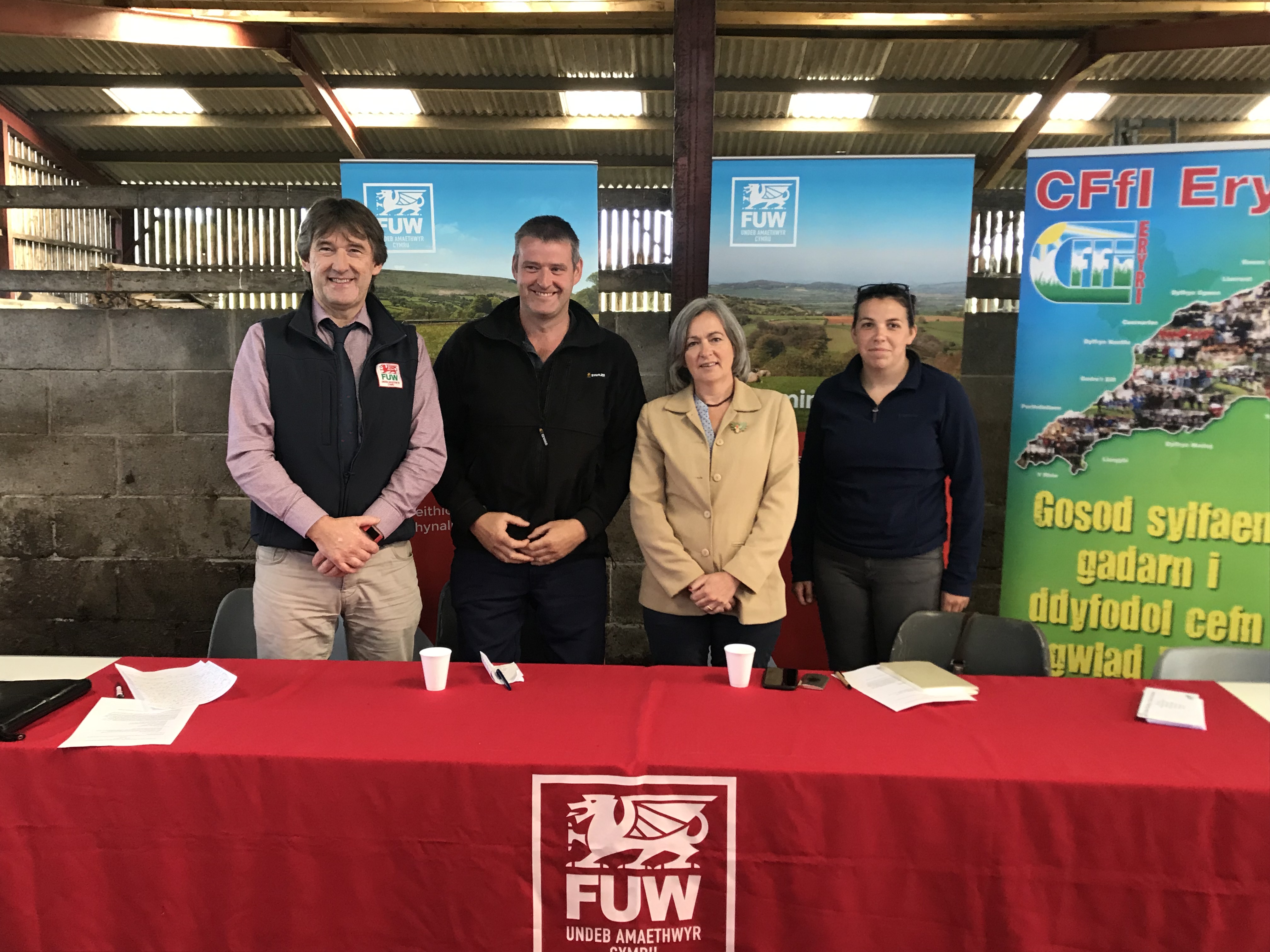 4th generation North Wales livestock farmer Dafydd Williams, who runs the family farm at Ystumcegid Isaf in partnership with his mother Helen, has raised concerns about the future of the industry with local MP Liz Saville-Roberts.
4th generation North Wales livestock farmer Dafydd Williams, who runs the family farm at Ystumcegid Isaf in partnership with his mother Helen, has raised concerns about the future of the industry with local MP Liz Saville-Roberts.
Farming has been in the family for a long time and he is worried that there won’t be an industry worth entering when his children have grown up.
Dafydd and wife Miriam have two young children, Catrin 11 and 9 year old Robat, who hold the same interest as their father in farming.
The family own over 380 acres and rent a further 60 acres during the summer months, where they keep their beef and sheep stock. They also keep 60 acres of land to produce first cut silage, and cut a second crop depending on available summer forage. All the hay and straw they need is bought in.
The farm is home to over 550 Improved Welsh ewes with half being put to a Texel ram, and the remainder go to an Improved Welsh ram in order to keep 120 ewe lambs as replacements annually.
The remaining lambs are either sold as stores or finished off grass and all lambs are sold before the end of October in order to avoid having to feed over the winter.
Their cattle enterprise includes 45 suckler cows which are put to either a Charolais or Limousin bull, keeping 5 heifers annually for replacements. The remaining offspring are sold in the Spring and Autumn store cattle sales, half at 12 months of age and the remainder at 18 months.
The family have always been keen to support the local livestock market in Bryncir through which they sell all their animals, but are concerned about the future of the industry with Brexit and the chance of a no-deal looming.
Dafydd Williams said: “From a farming perspective, what we need is access to markets, what’s the point in going to Bryncir in a few months time if we haven’t got markets to sell to.
“The deal that is being talked about doesn’t in itself do anything for that, apart from maybe gain 2 more years of access to the EU markets. But it contains no trade deals, no new arrangements, in fact, it might even set back some currently available opportunities.
“We need to be able to sell our products, supply chains need to be working, markets need to be protected so that tariffs don’t destroy them and we need that assurance sooner rather than later. And this applies in the UK home market just as much as it does with EU nations and countries further afield.
“There are some very real challenges ahead for our sector, and we can’t overcome them all by ourselves. As farmers we are prepared to do all it takes to run our business efficiently, to produce food that is of the highest standard. However, if the UK Government can’t work this out, there will be absolutely no point in us trying to continue producing food.”
Conscious of their environment, the family have taken full advantage of opportunities to sign up to agri-environment schemes including ESA, Tir Cynnal and Glastir Entry and Advanced. However, with increasingly stricter and less flexible regimes they are concerned about how things will work in the future.
Walking the farm with the MP, Dafydd said:“As farmers and custodians of the countryside, we care deeply about the environment we farm in. We try our hardest to add positively to nature. No farmer purposely damages the environment and the fact that the use of fertilisers and pesticides has already been reduced, shows that we are willing to do our bit. However, all the environment schemes and future plans have to work hand in hand with food production. The stricter the rules and regulations get, the less inclined farmers will become to participate.
“It worries us that what is being proposed from Welsh Government in their current consultation will force farmers to choose between planting trees or producing food. There is of course also concern about how that will work in terms of income forgone and direct payments.”
Dafydd previously served as Prenteg Branch Chairman and is now proudly following in his Grandfather’s footsteps by serving as Caernarfon’s County Chairman, a post he has held for over a year. An issue that he frequently comes across in this role is livestock worrying.
He told the MP that urgent action needed to be taken to amend the 1953 Dogs (Protection of Livestock) Act in order to give the police better tools to deal with the increasing number of dog attacks on farm animals.
“Not a week goes past where I don’t hear of another livestock worrying incident, whether that’s up here in North Wales or the rest of the country. We have not held back in pointing out the untold stress such incidents cause farmers, the stress that it puts on the business and the wider implications it has on our rural economy.
“Livestock worrying is a complex issue of course, and we are frustrated that livestock attacks by dogs show no sign of decreasing. Despite significant industry investment, many members of the public remain unaware that their family pet can attack, injure or kill livestock.
“Farmers must be able to protect their animals and safeguard their businesses and it is essential that positive legislative changes are made in order to reduce the number of incidents and improve both dog and livestock welfare in Wales,” added Dafydd Williams.


